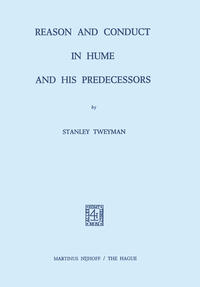
Can reason play a significant role in making moral distinctions and in generating moral precepts? In this book I attempt to provide Hume's answers to these questions in the light of his employment of the 'Experimen tal Method', his doctrine of perceptions, and his analysis of reason. In addition to this, attention is paid to some of Hume's rationalist predeces sors - most notably, Samuel Clarke and William Wollaston - in order to assess Hume's critique of the rationalists. Regarding the preparation of this book I wish to thank Professor Ronald J. Butler who introduced me to Hume's writings. Professors W. J. Huggett, R. F. McRae, and F. E. Sparshott each read the original draft of this book and provided me with extremely valuable comments and criticisms. My wife Barbara Tweyman and my mother Fay Tweyman provided me with constant support throughout the time I was preparing this book, and for this, as well as for many other things, I will always be grateful. My father-in-law, the late Joseph Millstone, a man I dearly loved and respected, also provided me with support during the time I was working on this book. His death is for me an incalculable loss, and his memory is something I will always cherish.